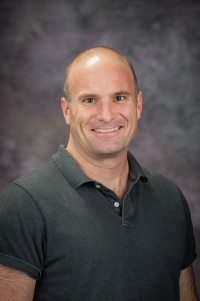Schmit part of newly funded center tackling big questions at the intersection of molecular and cellular bioscience with data science

K-State physics faculty member Jeremy Schmit is part of a team studying molecular and cellular properties of living systems using data science and computational methods. The National Science Foundation awarded $20 million to Pennsylvania State University to fund the newly created National Synthesis Center for Emergence in the Molecular and Cellular Sciences, or NCEMS, to support this research and cutting-edge collaborations. Its initial focus will be on the cellular mesoscale, which encompasses features larger than molecules but smaller than cellular structures.
According to Schmit, “The objective of NSF’s Synthesis Centers is to breathe new life into data that was acquired from previous grants. There are tons of data out there, but a lot of it is too scattered or simply in a format that isn’t useful for the theoretical community.”
Data scientists at NCEMS will comb through existing data banks and literature to build data sets that theorists can use. These data sets will then be turned over to working groups that will analyze the data to uncover new properties and behaviors that emerge on the cellular mesoscale.
Schmit was highly involved in generating ideas for this project from its inception. He was the visionary responsible for one of the center’s five themes “Modeling Emergent Properties using Dense Mesoscale Data” for which he will serve as thematic leader. As thematic leader, Schmit will oversee working groups that build theoretical models from the newly compiled data sets.
“In this theme we are taking a new approach to cellular and molecular biology by working ‘top-down’ to learn how cells work,” Schmit said. “We have very few concepts to understand biological process larger than molecules but smaller than organelles and our goal is to fill that conceptual gap.”
Broad participation will be encouraged in the center’s activities through workshops, training events, and research-based learning opportunities in order to ready an accomplished workforce to advance life and data science careers in the United States.